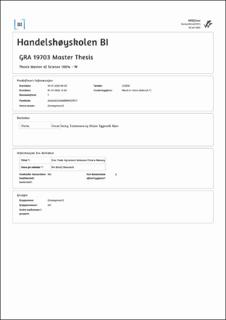Free Trade Agreement between China & Norway : An Empirical Study on the Effect of a Free Trade Agreement between Norway and China
Master thesis
Permanent lenke
https://hdl.handle.net/11250/3039061Utgivelsesdato
2022Metadata
Vis full innførselSamlinger
- Master of Science [1621]
Sammendrag
This master thesis investigates the potential effects of the proposed free trade agreement implemented between China and Norway on bilateral trade flows. A fixed-effect regression technique with a basis in the gravity equation of trade serves as a workhorse for estimating the impact of free trade agreements. Individual predictions based on the two countries' previously implemented free trade agreements show that China usually benefits from a 37 percent increase in bilateral trade. At the same time, Norway has a surprisingly negative 9 percent decrease in bilateral trade. The study is then nuanced by categorising bilateral trade flows of countries to measure the effects of different country sizes on trade. We also use a regression discontinuity design where exports and imports are individualized. Deviating results of Norwegian free trade agreements in relation to those of others, including China, indicate a difference in the content of the treaties and ways of implementation. The results suggest that individual differences in free trade agreements make it unsuitable to treat them as equal and emphasize that Norway negotiates most of the agreements with the EFTA countries and not individually, as in the case of China. This study finds evidence that a free trade agreement would yield an increase in the bilateral trade flows between Norway and China, but raises concern about the effect on the trade balance. Since Chinese free trade agreements tend to increase exports relative to imports, this could amplify the deficit in the Norwegian trade balance in relation with China.
Beskrivelse
Masteroppgave(MSc) in Master of Science in Business, Economics - Handelshøyskolen BI, 2022
